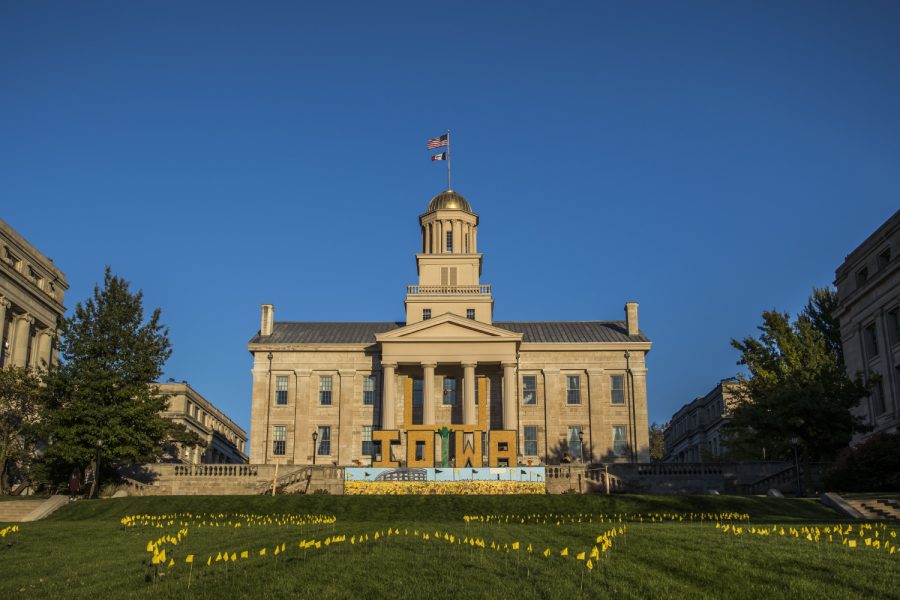UI Faculty Senate expands catastrophic leave donation policy to include more faculty members
The University of Iowa has expanded its catastrophic leave donation policy to include non-vacation accruing faculty and staff members.
The Old Capitol is seen with the Iowa Homecoming Corn Statue in front on Thursday, October 18, 2018.
September 18, 2019
The University of Iowa Faculty Senate unanimously passed a proposal on Tuesday to change the state Board of Regents policy for certain faculty and staff to take leave in cases of catastrophic illnesses.
This change to the UI’s catastrophic-leave policy would allow nonvacation-accruing faculty and staff with a 50 percent time or greater appointment to receive donated vacation time from vacation-accruing faculty members. This faculty or staff member can then convert the donated vacation time to sick time and excuse the period they will be absent from work due to catastrophic illness or injury.
Defined as a medical condition for which a physician has certified a likely loss of 30 or more workdays, a catastrophic illness impedes employees from functioning in a work environment.
“It’s a situation where there is clearly a need,” Faculty Senate Past President Russell Ganim said. “The university has shown good faith in trying to meet this need. We are just trying to come up with mechanisms to ensure that the people who need coverage can get it, and yet we still need to work with the existing system.”
Current policy does not allow nonvacation-accruing staff and faculty members who contract catastrophic illness or injury to accept donated vacation time for sick leave. Faculty who do not accrue vacation time and are not eligible to participate are generally faculty with academic-year appointments, meaning they are not required to work over the summer or winter breaks.
To receive donations, the faculty or staff member needs to have exhausted paid leave and not be receiving long-term disability.
Most faculty on campus are not vacation-accruing employees, but instead accrue sick time, Faculty Senate President Sandy Daack-Hirsch said. The people who are not covered under the catastrophic-leave policy before Tuesday’s vote are those who do not accrue vacation.
RELATED: UI faculty group petitions to pool sick-leave dates into a communal bank
Because the UI lacks a sick-leave bank, an individual must request and receive donations directly. The initiative to make catastrophic-leave policy more inclusive than just vacation-accruing faculty and staff began in April with the support of many faculty members.
“We eventually came to the conclusion that we needed a two-tiered approach,” Daack-Hirsch said. “The first tier of this approach is to expand who can actually receive the donation, so we ask that nonvacation–accruing faculty and staff can also receive donations.”
This is something that could be implemented by January, Daack-Hirsch said.
Daack-Hirsch said the second part of the faculty plan, which includes the exploration of potential sick-leave donations instead of exclusively donated vacation time, will take longer to implement.
“[This] would take a change in the Iowa Code as well, so it’s not something that the [university] president or the Board of Regents could decide to do,” Daack-Hirsch said. “It’s bigger than us.”
RELATED: Guest Opinion: Iowa faculty deserve a sick leave bank
She said faculty will work with UI Human Resources on implementing the policy to determine how employees will ask for donations, how to manage the donations, and how to work with the different colleges and their respective cultures to encourage donations.
“We are supportive of the proposal and look forward to working with members of the Faculty Senate, Staff Council, and the Board of Regents to consider this change to board policy,” UI Chief Human Resources Officer and Associate Vice President Cheryl Reardon said in an email to The Daily Iowan.
The proposed change to the regents’ policy would allow faculty with half-time or greater appointments to receive donated time. Daack-Hirsch said the goal is for this to be on the docket for the regents’ November meeting.
“I think it’s an important first step,” Daack-Hirsch said. “I look forward to working in the next year or two of now can we look at what’s donated and not just who can receive it, and the process piece of it.”






